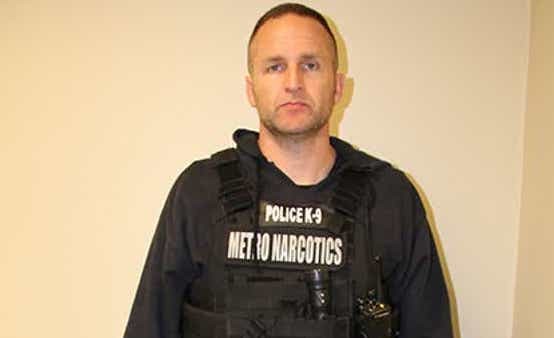In 2020, many protesters across the country had one central demand as they marched through the streets calling for justice: Arrest the cops who killed Breonna Taylor.
Nearly two years later, one of the officers who fired his gun in the March 13, 2020 raid on her apartment — former Louisville Metro Police Department detective Brett Hankison — is set to stand trial, but not for her death. Hankison will instead face charges of wanton endangerment for shots he fired during the raid that entered a neighboring apartment.
Of the officers involved in the raid, Hankison is the only one facing charges for his actions.
Hankison’s trial begins on Tuesday, Feb. 1, with the questioning of 250 potential jurors getting underway.
Here’s a preview of what to expect and a look back at what happened and how we got here.
What happened in the raid?
Before 1 a.m. on March 13, 2020, LMPD officers serving a warrant on Breonna Taylor’s Louisville home breached her apartment’s door. Taylor’s boyfriend, Kenneth Walker, fired a single shot from a handgun, hitting Sgt. Jonathan Mattingly in the leg. Police returned fire, shooting 32 rounds and killing Taylor.
Walker would say he did not know it was police breaching the door and thought it was a home invasion.
The warrant police were serving was tied to a narcotics investigation of Jamarcus Glover, an ex-boyfriend of Taylor’s.
Three officers — Mattingly, Hankison and Detective Myles Cosgrove — fired their weapons in the raid. It was determined by the FBI that Cosgrove fired the shot that killed Taylor.
Hankison and Cosgrove were both fired from LMPD for firing their weapons without identifying a threat in violation of the department’s policy on the use of deadly force. A third LMPD officer, Detective Joshua Jaynes, was fired for being untruthful in obtaining the search warrant for Taylor’s apartment. Mattingly, the other officer who fired his weapon in the raid, was not terminated and retired from LMPD last year.
On Sept. 23, 2020, Kentucky Attorney General Daniel Cameron announced that Hankison would be facing three counts of wanton endangerment for shots he fired during the raid that entered a neighboring apartment. No charges were brought against other officers — or even presented to the grand jury that indicted Hankison.
Outrage over Taylor’s killing saw months of street protests in Louisville.
What charges does Hankison face?
Hankison faces three charges of wanton endangerment in the first degree, one count for each person that was in the neighboring apartment.
According to Kentucky law, “A person is guilty of wanton endangerment in the first degree when, under circumstances manifesting extreme indifference to the value of human life, he wantonly engages in conduct which creates substantial danger of death or serious physical injury to another person.”
Wanton endangerment in the first degree is a Class D felony in Kentucky, with each count punishable by between one and five years in prison. Class D felonies are the lowest class of felony in Kentucky.
What did Hankison do during the raid?
In his March 25, 2020 interview with Public Integrity Unit investigators, Hankison said he had seen a person in Taylor’s apartment with an AR-15 or “a long-gun, a rifle-type gun” in a shooting stance when the door was breached. When a shot was fired, Hankison said he moved back away from the doorway and ran around the corner of the apartment’s exterior. From that position, he told the investigator that fired through a sliding-glass door and a window at muzzle flashes that he believed were coming from the weapon of the person inside the apartment.
“I didn’t know if John was down, and they couldn’t get his body out or he was — but all I could hear was the firing and I saw the flashes. I thought they were just being executed, because I knew they were helping John,” he said.
He said his “only option” was to return fire from that position.
The ballistics investigation deemed that the bullet that hit Mattingly was fired by a 9mm handgun. Additionally, Walker said he fired one shot from a handgun, and Mattingly told Public Integrity Unit investigators he could see a man holding a handgun when the door was breached.
Some of the 10 rounds Hankison fired entered a neighboring apartment. Announcing the charges in Sept. 2020, AG Cameron said there was no evidence that any of Hankison’s shots hit Taylor.
On June 19, 2020, it was announced that LMPD would fire Hankison. A termination letter from then-acting chief Robert Schroeder said Hankison’s actions during the raid “displayed an extreme indifference to the value of human life” when he “blindly fired ten rounds” into Breonna Taylor’s apartment. Schroeder added that the patio door and window which Hankison fired through were covered in a material that “completely prevented” Hankison from identifying a target.
When does the trial start?
Juror questioning is set to take three weeks as a pool of 250 will be chiseled down to 50 by Feb. 22. Once the pool is down to 50, 12 jurors and several alternates will be selected. Once a jury is seated, the trial will begin.
Why is jury selection taking so long?
Voir dire — the questioning of potential jurors to identify biases — is usually done in a group setting. However, due to the high-profile nature of the Hankison trial, potential jurors will be questioned individually on the witness stand.
“If the attorneys and the court are trying to explore the level of familiarity of a potential juror with the facts of the case, by doing it individually, away from other jurors — whether it’s public or not — that juror can say thing that other potential jurors didn’t even know,” said Larry Simon, a criminal defense attorney in Louisville. “So that’s one of the reasons that you do it individually when there’s a case that has a lot of publicity, because you don’t want to poison — for lack of a better word — other potential jurors hearing something from another juror that they didn’t even know about.”
In addition to being exposed to details about the case they might not know, Simon added that potential jurors might also hear misinformation or otherwise incorrect information from other prospective jurors in group voir dire.
Finding a local jury that has no knowledge of the raid that killed Breonna Taylor is likely impossible. And with the killing sparking widespread protests — as well as backlash against protesters — finding people without opinions on what happened during the raid might be difficult as well.
“Good luck trying to seat 14 people who don’t have an opinion about this,” said Nick Mudd, another Louisville criminal defense lawyer who previously worked as an assistant commonwealth’s attorney for Jefferson County.
In the 2021 murder trial of former Minneapolis police officer Derek Chauvin, who kneeled on George Floyd’s neck for nine minutes, killing him, jury selection took two weeks.
Will the media be allowed to watch the jury selection process?
Citing the high-profile nature of the case, Hankison’s attorney Stewart Matthews filed a motion in January to bar the media from watching jury selection, saying the presence of the media for the individual questioning could have a “chilling effect” on the candor of potential jurors. However, Judge Ann Bailey Smith struck down that motion in a Jan. 27 order.
While journalists and members of the general public will be allowed in the courtroom for the jury selection process, Smith is prohibiting the use of both still and video cameras.
In her order, Smith wrote that individual voir dire is “inherently intimidating to a lay person” and that by keeping cameras out of the courtroom, “jurors will be likely to be less intimidated by this process, and therefore more likely to be candid in their responses, if they know there is no possibility that the general public and the media present at the proceeding have the ability to broadcast or otherwise record their testimony.”
What can we expect to see in the trial?
Mudd, the Louisville attorney, said that proving Hankison showed “extreme indifference to the value of human life” would be a “hard hurdle” to overcome for the prosecution.
While he anticipates the prosecution to present Hankison as a rogue officer who broke with LMPD’s training in how he acted during the raid, Mudd expects the defense to argue that Hankison was returning fire to where he thought gunfire was coming from — and was doing so to preserve the life of himself and fellow officers.
“It’s not a whodunnit, and I don’t think most of the facts are going to be in dispute. What I think is going to be the case is the mental state,” he said.
According to a motion filed by Hankison’s lawyer in early January, Hankison intends to testify at his trial. The defense also plans on calling 11 other current or former LMPD officers, including Mattingly and Cosgrove, the two other officers who fired their weapons during the raid on Taylor’s apartment.
Cosgrove and Mattingly have spoken publicly about the raid — with Mattingly even writing a book about it that is scheduled to be released in March — but the trial will be the first time Hankison does so.
If found guilty, could Hankison spend time in prison?
Class D felonies are punishable by between one to five years in prison — meaning Hankison could face up to 15 years behind bars. But defendants convicted of Class D felonies can also be sentenced to probation.
In making decisions on probation, the court considers things like the risk of the defendant committing another crime, their history and their character.
Hankison would traditionally be a good fit for probation under the criteria in the Commonwealth’s probation statute, Simon said, but there is one clause that could make that tricky: A stipulation that probation cannot be given if it would “unduly depreciate the seriousness” of the crime.
“He may have a low probability or unreasonable likelihood that he’d commit a future offense — and maybe he doesn’t need any counseling — but if probation would unduly depreciate the seriousness of the offense, that’s a consideration the court would have to take into consideration,” said Simon.
This story was originally published by CityBeat sister paper LEO Weekly.
Stay connected with CityBeat. Subscribe to our newsletters, and follow us on Facebook, Instagram, Twitter, Google News, Apple News and Reddit.
Send CityBeat a news or story tip or submit a calendar event.






